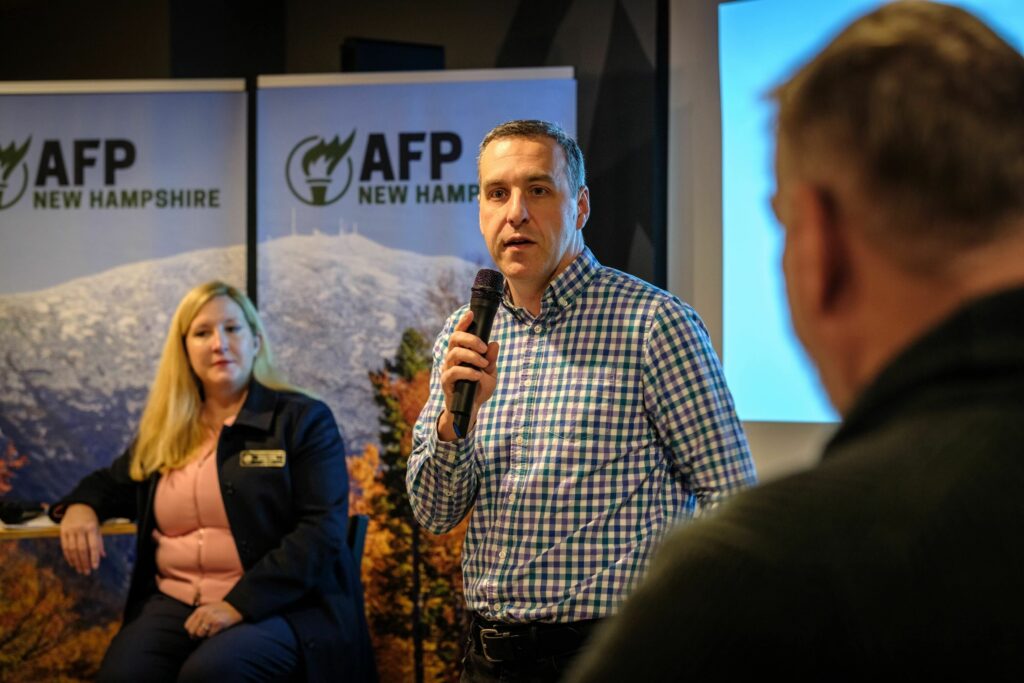Proponents of the power of free markets gathered at Manchester Tuesday night to take on the question: Why is healthcare so expensive?
Their answer: Government regulation interfering with market forces. Given that the event was hosted by the New Hampshire chapter of Americans for Prosperity, that answer wasn’t a surprise.
The event, part of AFP-NH’s Pints and Policy series, was held at the Great North Aleworks at the same time presidential candidate Nikki Haley was fielding healthcare questions at a town hall just a few miles away in Derry.
AFP’s political arm, AFP Action, endorsed Haley earlier that day.

Health policy expert Jared Rhodes speaks at a Policy and Pints event hosted by AFP-NH at Great North Aleworks on November 28, 2023.
AFP-NH state director Greg Moore told NHJournal that addressing healthcare is a key issue for his organization and for the state’s economy.
“Healthcare costs are a huge factor in many families’ budgets, and New Hampshire has some of the highest in the country. We need solutions that give Granite Staters more options for high-quality, affordable healthcare. Our event looked at some of the policies at the state and federal level that make costs so expensive and offered real solutions,” Moore said.
The keynote speaker was Jared Rhoads, an MPH with the Dartmouth Institute for Health Policy and Clinical Practice. Rhoads wrote “Enhancing Healthcare Options in New Hampshire: The Direct-Pay Pathway,” a policy paper for Saint Anselm College’s Center for Ethics in Society.
Rhoads expressed interest in direct-pay or cash systems, shared his frustration with federal regulation, and called for greater transparency and competition within the healthcare space.
Before the pints began flowing, Rhoads sat down with A. J. Kierstead of The New England Take laid out his healthcare vision. He said he sees a middle ground, allowing for both high-deductible health plans for catastrophic events alongside a direct pay system. “If we made a few tweaks, we might be able to get a more competitive landscape with more competitive prices for those kinds of midrange surgeries. At that point, consumers would really feel like they’ve got a viable full-range alternative,” Rhoads said.

State Rep. Erica Layon (R-Derry), vice chair of the House Health, Human Services and Elderly Affairs Committee, also spoke at the AFP event. Layon was a medical device analyst for nearly 15 years, “covering companies that make implantable devices: orthopedics, cardiology, neurology, diabetes technology, a whole bunch of different areas in the healthcare space,” she said.
Layon endorsed cash-pay setups for hospitals, which are already in place for physicians but not facilities. Cash-pay providers do not accept insurance. “When it goes to the insurance companies, [the costs] will never be clear. Their business model is to make it unclear so that they can provide those services.”
Moore also raised an issue “in the foreign policy space: American taxpayers and American consumers are paying for almost all of the R&D [research and development] costs for the world because all of these other countries have these national-social healthcare systems, and they will only pay the actual cost to make the pill.”
Moore endorsed direct payment methods, arguing they are cheaper than the currently overregulated system.
Rhodes and the other speakers argued expanding direct pay shouldn’t be dismissed as a controversial or radical approach. However, many critics focus on direct primary care specifically, not the potential expansion of the model to facilities.
For example, Ken Terry, a journalist and the author of “Physician-Led Health Care Reform: A New Approach to Medicare for All,” wrote that the problem with “direct primary care (DPC) is that it inherently limits access to care because DPC physicians have smaller patient panels than those who accept insurance.” It is not clear that facilities would face the same hurdles.
In Derry, Haley was echoing the AFP arguments that giving patients more power and control is key to fixing the soaring healthcare costs in America.
“The focus should be: How do we get the patient out of the backseat of the car?”
She wants consumers to know what they are paying for so they can make choices to bring down prices.
“We have to break it. We have to open up healthcare. You have to make it all transparent. From the insurance companies to the hospitals to the doctors’ offices to the pharmaceuticals to the PBMs— everything in between. They all have to show us their warts. They don’t get to hide anything anymore.”
Haley also called for tort reform and for ending the practice of government limits on the number of healthcare facilities or providers in a specific area by issuing “certificates of need.” Haley would allow the market to guide these decisions.
“We need to have competition in healthcare. That’s how we get the patient from the backseat to the driver’s seat.”





